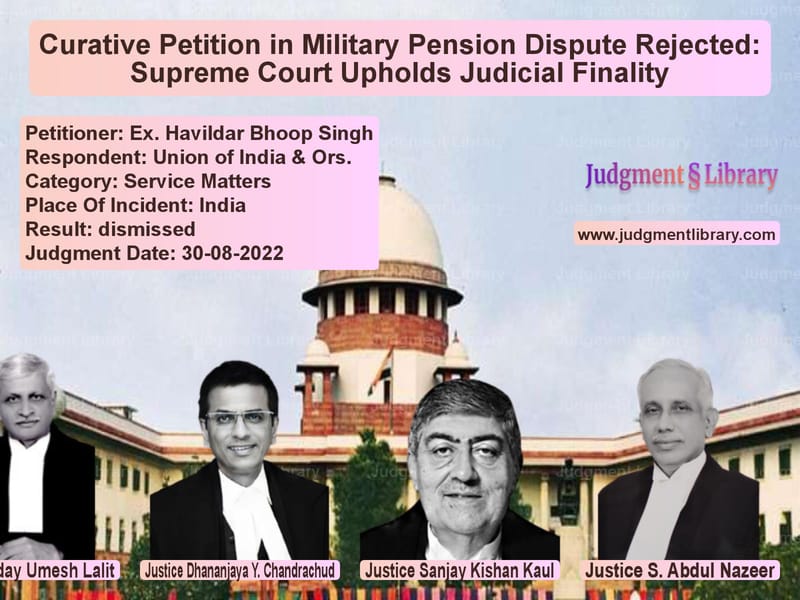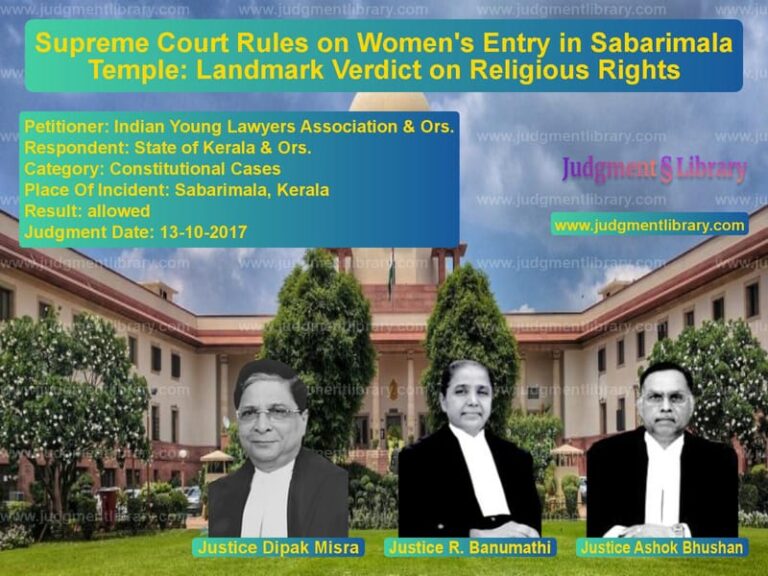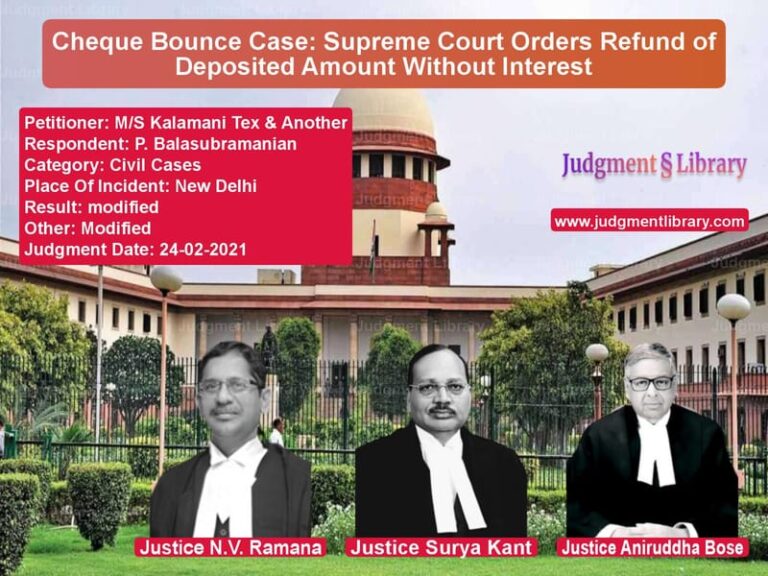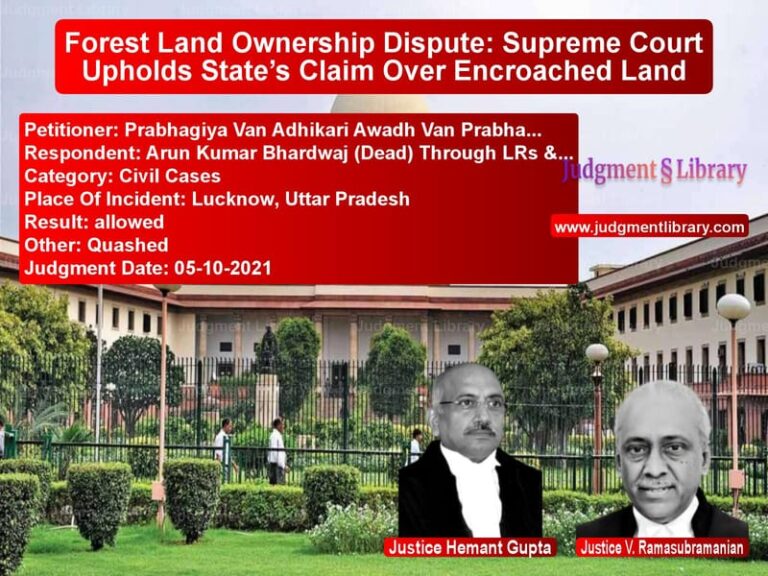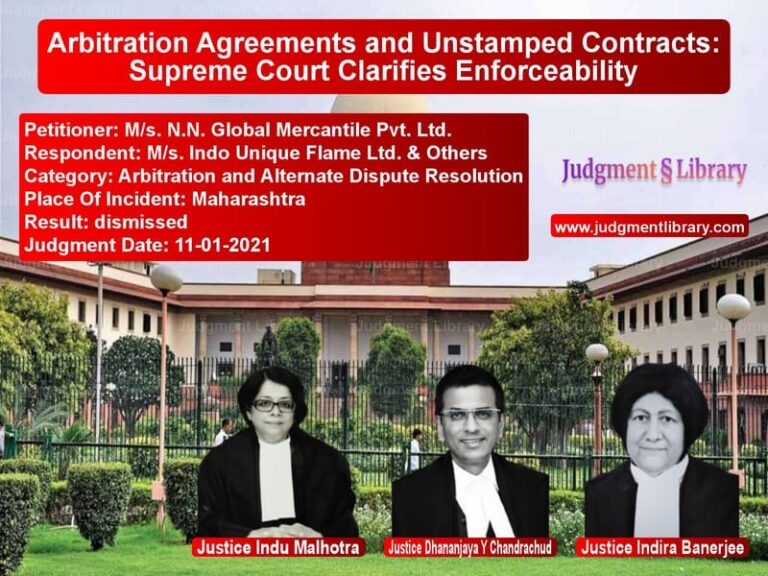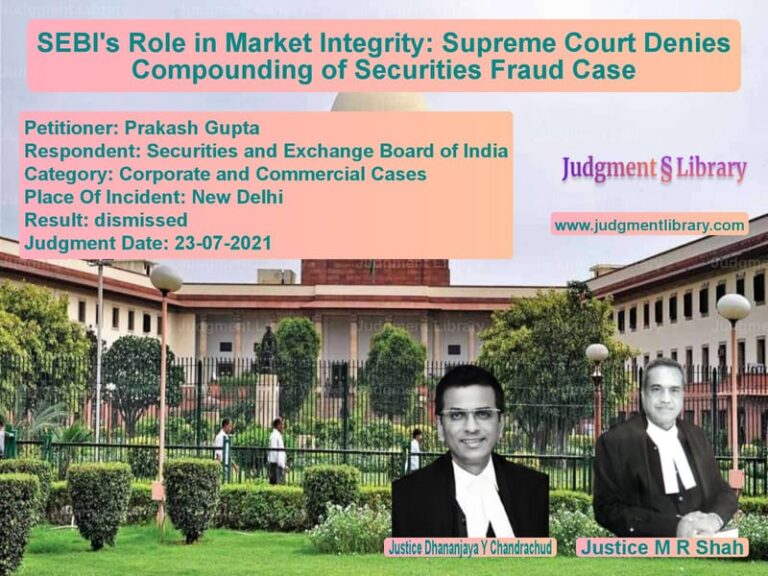Curative Petition in Military Pension Dispute Rejected: Supreme Court Upholds Judicial Finality
The case of Ex. Havildar Bhoop Singh vs. Union of India & Ors. revolved around a curative petition filed by a retired military personnel seeking reconsideration of a Supreme Court judgment related to his pension benefits. The Supreme Court was called upon to determine whether a curative petition could be entertained after the dismissal of a review petition.
This case is significant because it delves into the strict principles governing curative petitions, which serve as a last resort for litigants who claim that they have suffered grave injustice despite exhausting all available legal remedies. The judgment in this case reinforces the finality of Supreme Court decisions and upholds the stringent conditions under which curative petitions may be entertained.
Background of the Case
The petitioner, Ex. Havildar Bhoop Singh, had earlier challenged the denial of enhanced pension benefits. His civil appeal was dismissed in Civil Appeal No. 3441 of 2019, and his subsequent review petition under Review Petition (Civil) Diary No. 19482 of 2020 was also dismissed. Unwilling to accept the outcome, he filed a curative petition under Curative Petition (Civil) No. 88 of 2021, seeking a final reconsideration of his case.
The curative petition was filed under the Supreme Court’s inherent jurisdiction, invoking the principles established in Rupa Ashok Hurra vs. Ashok Hurra & Another, (2002) 4 SCC 388. This landmark judgment laid down the scope and limitations of curative petitions, specifying that such petitions should only be entertained in cases of a “gross miscarriage of justice” where there has been a violation of principles of natural justice.
Key Legal Questions
The Supreme Court had to decide:
- Whether the curative petition met the strict parameters set in Rupa Ashok Hurra for re-examining a case after the dismissal of a review petition.
- Whether the petitioner had suffered any grave injustice that warranted reconsideration under curative jurisdiction.
- Whether there was a violation of principles of natural justice in the earlier judgments.
Arguments Presented
Petitioner (Bhoop Singh) Arguments
- The petitioner argued that his pension benefits were unjustly denied and that his case merited reconsideration.
- He contended that there was a fundamental error in the previous judgment that warranted intervention.
- He claimed that the Court had not considered crucial evidence that could have altered the outcome of his case.
- He urged the Court to exercise its curative jurisdiction to correct what he believed was a miscarriage of justice.
Respondent (Union of India) Arguments
- The government contended that the Supreme Court had already reviewed and dismissed the petitioner’s claims, making the matter final.
- They argued that the curative petition did not meet the strict criteria established in Rupa Ashok Hurra for cases involving gross miscarriage of justice.
- They asserted that the judgment was binding and that allowing a curative petition in this case would set a dangerous precedent, enabling endless litigation.
Supreme Court’s Analysis and Judgment
The Supreme Court examined the curative petition in light of its decision in Rupa Ashok Hurra, which lays down strict conditions under which a curative petition can be entertained.
Key Observations by the Supreme Court
- The Court reaffirmed that curative petitions are an extraordinary remedy meant only for cases where there has been a “gross miscarriage of justice.”
- It ruled that merely disagreeing with a judgment does not justify invoking curative jurisdiction.
- The Court found no violation of principles of natural justice or procedural irregularities in the previous judgment.
- It emphasized that the judicial system cannot be undermined by allowing repeated attempts to reopen cases.
- The Court reiterated that the petitioner had already been granted ample opportunities to present his case during the initial appeal and the review petition.
Key Court Statement
“We have gone through the curative petition and the relevant documents. In our opinion, no case is made out within the parameters indicated in the decision of this Court in Rupa Ashok Hurra vs. Ashok Hurra & Another, (2002) 4 SCC 388.”
Read also: https://judgmentlibrary.com/m-p-medical-officers-pay-scale-dispute-supreme-courts-landmark-judgment/
Final Judgment
- The Supreme Court dismissed the curative petition.
- It reaffirmed that its previous decision in the review petition was final.
- The Court held that no further judicial review was possible in this matter.
Implications of the Judgment
This ruling has significant implications for curative petitions and the finality of Supreme Court decisions:
- It reinforces that curative jurisdiction is an exceptional remedy, not a routine appeal process.
- It ensures that judicial finality is respected, preventing abuse of the court system.
- It upholds the principle that mere disagreement with a judgment does not constitute a “gross miscarriage of justice.”
- It prevents excessive litigation by setting a high threshold for curative petitions.
- It strengthens the authority of the judiciary by ensuring that only the most exceptional cases are reconsidered.
Conclusion
The Supreme Court’s decision in this case upholds the integrity of curative petitions as a rare legal remedy. By dismissing the petition, the judgment reaffirms that curative relief is only granted in cases of grave injustice and cannot be used as a substitute for multiple appeals. The ruling sets an important precedent for future cases involving curative petitions in India.
Petitioner Name: Ex. Havildar Bhoop Singh.Respondent Name: Union of India & Ors..Judgment By: Justice Uday Umesh Lalit, Justice Dhananjaya Y. Chandrachud, Justice Sanjay Kishan Kaul, Justice S. Abdul Nazeer.Place Of Incident: India.Judgment Date: 30-08-2022.
Don’t miss out on the full details! Download the complete judgment in PDF format below and gain valuable insights instantly!
Download Judgment: ex.-havildar-bhoop-s-vs-union-of-india-&-ors-supreme-court-of-india-judgment-dated-30-08-2022.pdf
Directly Download Judgment: Directly download this Judgment
See all petitions in Pension and Gratuity
See all petitions in Public Sector Employees
See all petitions in Employment Disputes
See all petitions in Judgment by Uday Umesh Lalit
See all petitions in Judgment by Dhananjaya Y Chandrachud
See all petitions in Judgment by Sanjay Kishan Kaul
See all petitions in Judgment by S. Abdul Nazeer
See all petitions in dismissed
See all petitions in supreme court of India judgments August 2022
See all petitions in 2022 judgments
See all posts in Service Matters Category
See all allowed petitions in Service Matters Category
See all Dismissed petitions in Service Matters Category
See all partially allowed petitions in Service Matters Category

